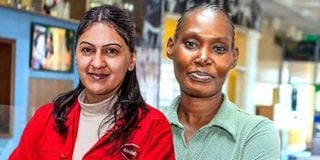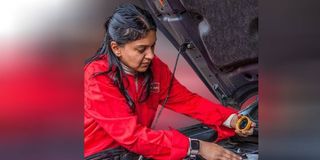Premium
We chose male-dominated careers and we’re shining

Beejal Pandit (left) and Irene Naliaka.
In an era where conventional norms and roles have long dictated the narrative, International Women's Day emerges as a powerful symbol of progress, championing the cause of gender equality and lauding the extraordinary achievements of women who have shattered the proverbial glass ceiling.
The Saturday Magazine shines light on bold women who have stepped into fields which are overwhelmingly occupied by men, breaking down long-standing stereotypes and transforming the fabric of these professions.
Top-notch mechanic
One of them is Beejal Pandit, 41, a mechanic who has been running the Arun’s Auto Limited garage for 14 years. For Beejal, her inspiration to fly her dad’s name not only nationally but globally led her to joining the industry despite having studied a totally different area.
“I studied something quite different. I have a degree in marketing management, software engineering (and) a few diplomas in computers. But if you ask me to work on one, I don’t know much,” she says.
Though she had an orientation of cars from an early age, initially, Beejal was only entrusted with administration works but her interest grew as cars kept flocking their compound.
“My dad was working for Subaru Kenya for 36 years. When he retired, people would come home to ask him for advice about their cars. He demolished my grandmother's house and started the garage. He would teach me from (holding) a spanner to running a battery… the small things.”
While her job has not been a bed of roses, with her work being thrown under the bus due to the owners’ mistakes, a memory etched in her mind is when she correctly diagnosed a car’s issue without relying on computer diagnostics.
“The car (Subaru) was misfiring. It had gone to several mechanics but the problem persisted. When it came to us, I noticed it was a small pipe that had been missed out and I repaired it. The car has been to date,” she explains, smiling.
For women wanting to venture into the automotive industry, Beejal advises: “It is not a bed of roses. You are going to walk on a lot of thorns, pissing off so many people, but at the end of the day it is the pleasure of doing something that is not in your field.”
Long-distance driver
When push comes to shove, human instincts kick in, and the fight for survival goes full-throttle. Such was the case for Irene Naliaka, who became a professional driver, ferrying cars from Mombasa to Kampala to support her family after an accident had left her husband immobilised.
After self-reflection and disappointments from previous businesses she had begun, Irene realised that driving was a skill she had that could put food on her table.
“On the reporting day, I showed up with my son who was then nine months old. I had his diaper bag and my bag. ‘What about the baby?’ ‘I’m moving with my baby.’ And they thought it was a joke,” she recalls.
Being her first drive, Irene made a three-hour stopover at Nakuru due to fatigue and upon reaching the Malaba border, she left her child with her mother then proceeded to Kampala.
Now about 10 years in the industry, Irene acknowledges that no day is the same while on the road with her challenging time being driving on a rainy day.
“In the Rift Valley, all the way to Eldoret, sometimes we experience hailstorms. You are driving and, from nowhere, ice cubes are falling on your screen and it's dark. You slow down, use the lights to indicate, heat the car, and slowly clear the hailstones because they do not last long. Once I felt that I could not manage, even the vehicle was not moving so I pulled aside,” she advises.
Additionally, discrimination pricks her nerves and on multiple occasions, Irene has stood up for herself and other women — either from bosses who felt that short ladies are not supposed to be in the profession or rogue drivers who bulldoze and bully female counterparts.
“I remember I was entering the No-Man’s Land bridge which then was narrow and the truck driver who was exiting expected that I would give way, but I closed in. The guy stopped, shouted and rolled up my window, creating a commotion. So, when the traffic police came, I explained that it was my turn to enter and he could not let me,” she recalls.
Nevertheless, since every industry has its highs and lows, Irene’s memorable day as a professional driver was when she took up the mantle of leadership after one of the cars in a convoy crashed into a canter.
“We had left Mombasa a bit early, so that means we are in the Rift Valley around daybreak. I'm on the normal speed for transit vehicles because also at that time there is less traffic. I looked ahead and my instincts sensed something was not right. I slowed down and saw about four vehicles, some from my convoy, having been involved in an accident,” she recollects.
“I parked my car then ran into the other vehicle. The driver had been seriously injured. I got him out of the wreck and put him in my car. When the police showed up, I explained what had happened and towed the crashed car to the police station.”
Be it as it may, Irene has never thought of quitting driving but instead hopes that she can one day drive a “hard” machine like operating a crane, a top loader or a grinder.

Beejal Pandit performs a car service at Arun's Auto Limited garage in Nairobi on May 30, 2023.
“For women aspiring to join the industry, they first need to have the right documents. Your driving licence has to be up to date, find out what is required by the National Transport and Safety Authority (NTSA), have the yellow fever jab and be trained by professionals.”
Fearless fisherwoman
Similar to Irene, Milicent Okinyi, a fisherwoman in Kadem, Migori County, was driven to pursue fishing by the need to shoulder her family’s responsibilities. Though many believe that it is a male’s job, Milicent shares that the women in the area are used to fishing.
“People who are not from this area believe that it is a man’s job but, in our locality, it is not. We are used to it. We team up with men and help,” she shares.
However, the job is never smooth all the time as she is forced to handle not only harsh windy seasons but also wild animals like hippopotamuses. Since fishing is not done in isolation, Milicent shares that moving in troops helps in such difficult circumstances.
“Sometimes I get the small fish which we call kanjwele and I'm ridiculed. They do not know I have pocketed profits from selling the fish.”
Embodying the undeterred spirit, Milicent says that the business has made her afford a better lifestyle for her family all year long.
“My children are in school; they are well-clothed and fed plus now we live in our own house which we constructed from the proceeds of fishing,” she says.
Unrelenting plumber
They say education is the key that unlocks the door to all life has to offer, including the gates of opportunity in fields traditionally dominated by men. That was the case of 28-year-old Ruth Irungu, who decided to square it out in a tertiary college, putting her name on the pedestal for male jobs.
“My dad advised me to do teaching but I did not want to be a teacher in future. But I loved doing things with my hands, so I looked for what I would pursue and plumbing was comfortable with me,” she explains, adding that she had the option of selecting tailoring but the way fresh graduates were treated by locals in her area dissuaded her.
“There was this lady who did tailoring but after she finished and opened her business, clients were just approaching her for repairs only,” she reveals.
Upon joining college in 2017, Ruth, 28, was among the four ladies in her class and all through learning, she had it smooth but was discriminated against when she started working.
“I fear electricity and do not like soldering pipes, but it has to be done. So, my then boss saw I did not like using electricity for that work and assumed I did not know anything else,” she recalls.
While her experience is isolated in the almost eight years of her profession, Ruth has since been having accommodative bosses who inform the client prior that there will be female employees working.
This has not only shielded her from potential bigotry, but also enabled her to find her niche and boosted her confidence in plumbing.
“Installing kitchen sinks and toilets are now my easiest tasks. But it was a hard one coming. I remember when I was studying, we really quarrelled with my lecturers because I did not like doing measurements... So, now in the field, I have learnt it the hard way and actually enjoy doing them,” she says.
Boda boda operator
With the last glimmer of hope being on her to venture into uncharted waters, Beatrice Mweni, 36, defied odds to join the boda boda industry. The single mother of three, who operates in Ngurubani, Kirinyaga County, reveals that in December last year, she made the bold decision to enrol at a driving school to learn boda boda riding after her job at a construction site ended and subsequently caused a struggle in getting casual work.
Her male counterparts ask her why she felt inclined to join a male-dominated field to earn a living. HEr answer is: “Work is work, so long as you get money.”
While most of her clients are males, Beatrice admits that many women have since appreciated her riding skills.
“I slow down on bumps and do not speed,” she says.
Some even question what made her join the industry, to which she explains, “I did not deliberate at all. I just went for it because in my mind, you should never choose the job you do since there is no work for men and for women. The goal should be to make money to fend for your children.”
On a good day, Beatrice says that she can make up to Sh1,500 and can save up to Sh700 after her daily expenditures. Her joy and pride come when she is able to meet her children’s needs.
“From when I started this business, there is nothing they have lacked. They are very happy to an extent that even when I snooze my alarm for waking up, my second born comes to wake me up,” she says.
For women wanting to join the industry, Beatrice advises that they need to go to school to learn how to drive professionally to protect their lives and those of their clients.
“If you go to school, you will know what to do when you get to a junction. Do not speed; just move slowly. You need to indicate that you intend to either turn right or left so that the motorist behind you can wait,” she explains.





